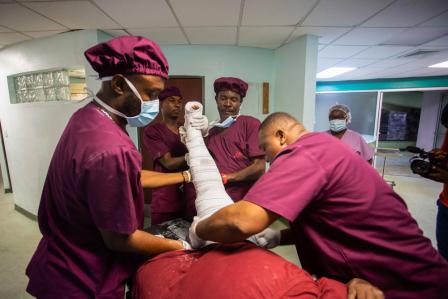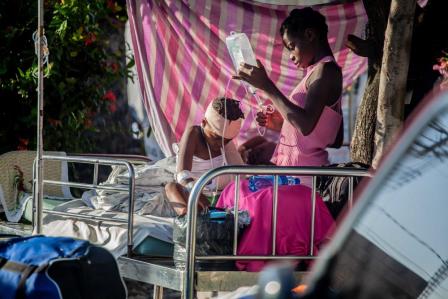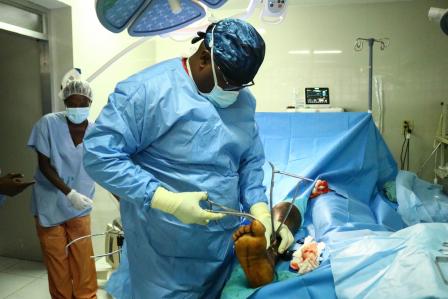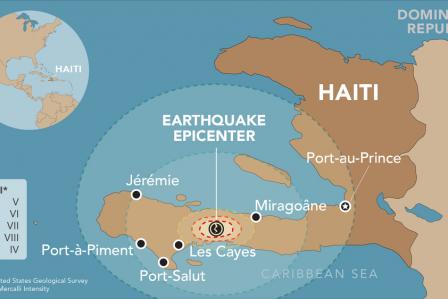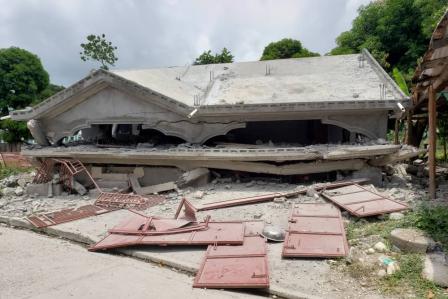Haiti: Earthquake survivors need continued care in the south
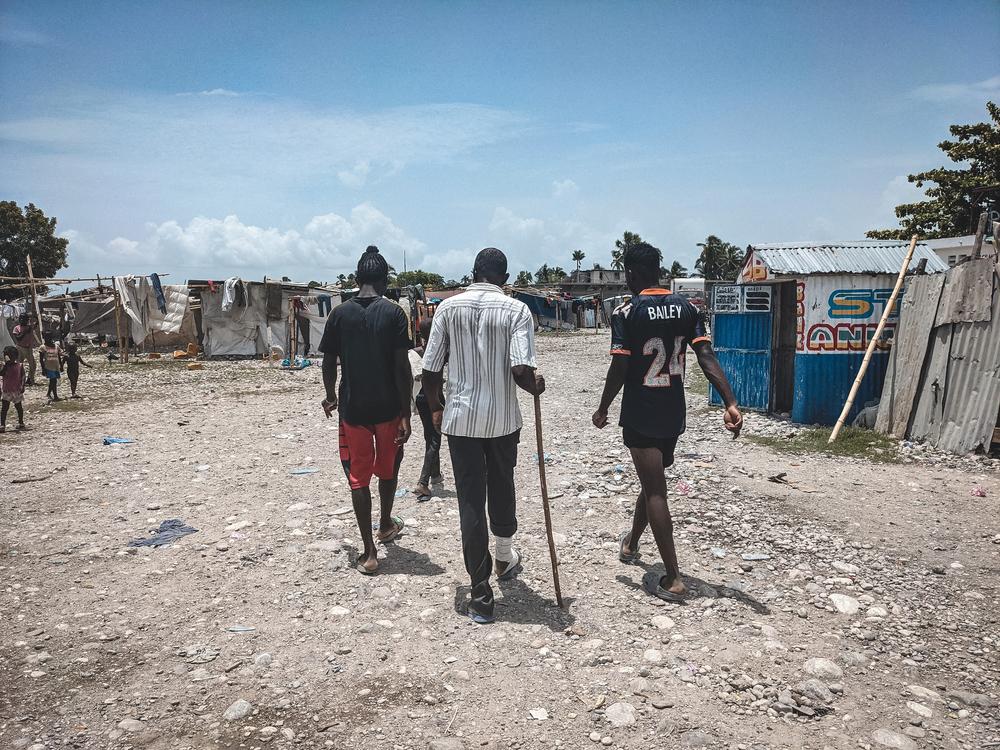
Jacques, a representative of the Croix des Martyrs IDP camp in Les Cayes, walks through the camp with two young men. Jacques helped Doctors Without Borders organize a mobile clinic for around 200 patients from the camp. Jacques was also one of the clinic's first patients, seeking care for an infected wound on his foot. September 2021. © Nico Dauterive/MSF
September 8, 2021—The greatest number of deaths and injuries from Haiti’s August 14 earthquake occurred in the country’s southernmost region, the Sud department. Prior to this disaster, hospitals and clinics were already scarce in remote areas of Sud, and the earthquake damaged or destroyed many health facilities and roadways, making it difficult for earthquake survivors in rural areas to reach care quickly.
At Hôpital Immaculée Conception (HIC) in Les Cayes, the capital of the Sud department, a Doctors Without Borders/Médecins Sans Frontières (MSF) medical team is providing surgical and post-operative care to more than 90 patients through a collaboration with the ministry of health.
My team arrived in Les Cayes on August 23. The hospital was overwhelmed. Children and adults were together. People were arriving at the hospital after several days with infected wounds.Prunau Mimose, nurse supervisor
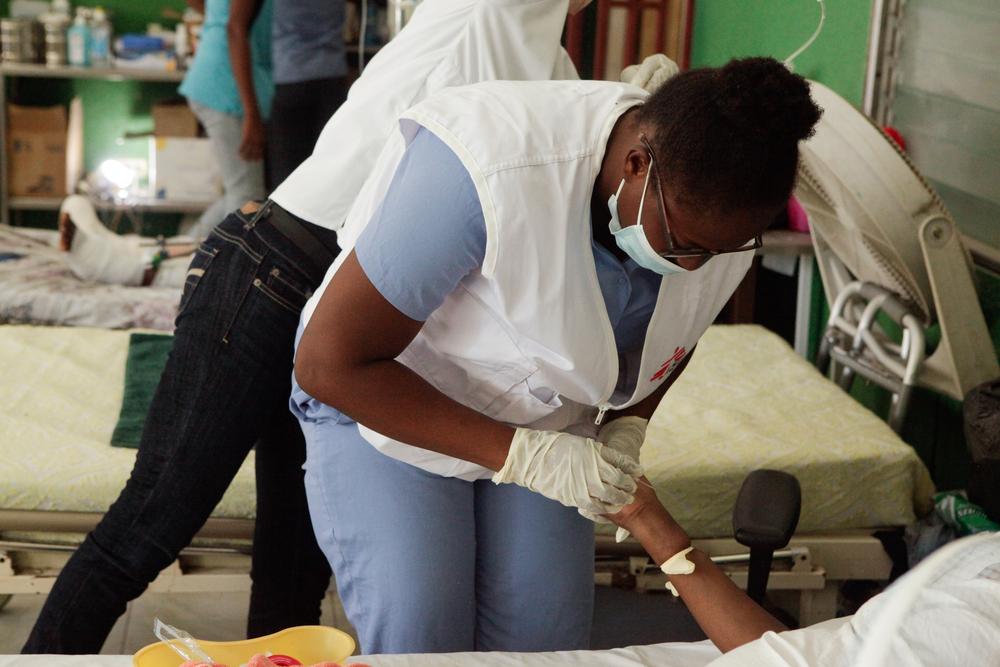
Doctors Without Borders nurse manages intravenous fluids for a patient in the post-operative room of the Immaculate Conception Hospital, Les Cayes, Haiti. September, 2021. © Alexandre Michel/MSF
Doctors Without Borders began providing surgical, post-operative and psychosocial care at the hospital and installed seven tents with a total of 62 additional patient beds. The hospital’s post-operative care room, where Prunau Mimose works, has been full almost continuously since the earthquake. As soon as a patient leaves a bed, another patient arrives.
Mimose manages the nursing activity and the coming and going of patients. She praises the local volunteers who have stepped up to work in the hospital as well as the staff.
If it weren’t for the volunteers, our job would be harder. They’re great people—they work nonstop.Prunau Mimose, nurse supervisor
Many of the patients, especially those in the region’s mountainous countryside, had a difficult, long journey to Les Cayes.
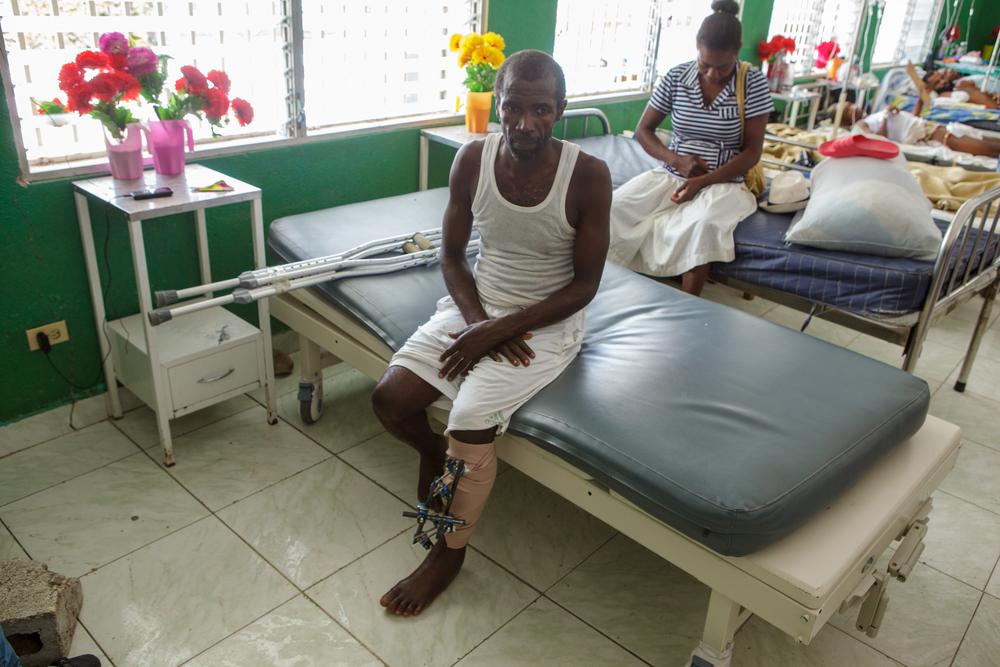
Jean Nader Joseph, who goes by Dèdè, was injured by a landslide during the August 14 earthquake as he tended cattle in the countryside near Camp Perrin, in Haiti's Sud department. He was treated at the Hôpital Immaculée Conception in Les Cayes. Doctors Without Borders provides surgical and post-operative care at the hospital, as well as psychosocial care and physiotherapy. Haiti, August 2021. © Alexandre Michel/MSF
I was off to tend the cattle when suddenly the earth shook. I was with a friend, and he was the first to see the landslide. No sooner had he shouted, ‘Dèdè rocks are tumbling toward us!’ when a boulder hit him on the head. He died instantly, and the same boulder struck my leg. I spent the night in the bush, and it was not until the next morning that my wife and neighbors came to free me.Jean Nader Joseph, who goes by Dèdè
Dèdè says he first sought treatment from a traditional healer for his injuries, but when he learned that the Hôpital Immaculée Conception was providing care for earthquake survivors free of charge, he went there. After 12 days in the hospital, he had just been discharged and was about to return to his village two hours away in the mountains beyond the town of Camp Perrin. But like many trauma patients, he will still need follow-up care. As more patients progress in their treatment, Doctors Without Borders has started providing physiotherapy at the hospital.
Once the acute phase of taking charge of the injured has passed, we have a lot of work to do on post-operative care, in particular to avoid the risk of infection and ensure proper rehabilitation. The idea is to avoid post-operative infections which could have quite serious consequences for their long-term mobility.Carla Melki, emergency coordinator
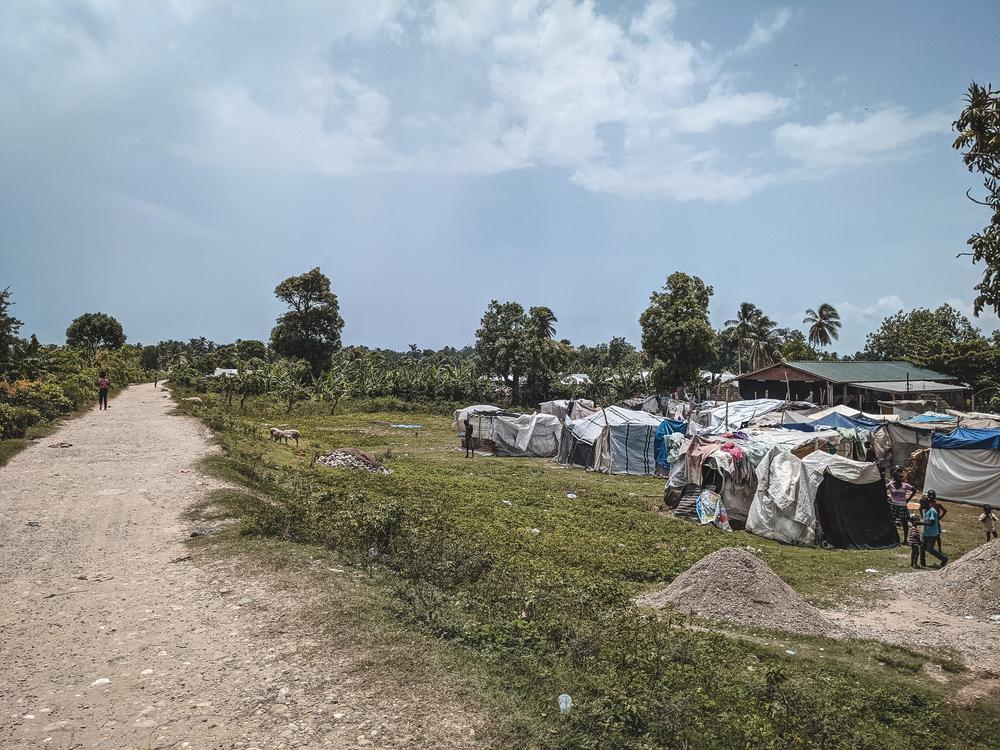
The Croix des Martyrs IDP camp is home to hundreds of families. Many have been at the camp since Hurricane Matthew in 2016. The Doctors Without Borders mobile clinic visited the camp to provide primary and mental health services. Haiti, September 2021 © Nico Dauterive/MSF
Many patients' homes were destroyed, making it more challenging to provide follow-up care once they are discharged. Doctors Without Borders is working to ensure that discharged patients have shelter, Melki says.
In order to reach patients who cannot make it to Les Cayes on their own, on August 23, Doctors Without Borders began running two to three mobile clinics per day to rural and remote areas severely affected by the earthquake. To travel to some areas, the teams must use motorcycles or travel on foot with donkeys to carry their supplies. Other areas are only accessible by air or sea.
Most areas close to the epicenter, especially near Maniche or Aquin, are difficult to reach. We have made exploratory visits to identify villages where we can provide care. We have also visited camps for displaced people in the center of Les Cayes, some of which have been there since the 2010 earthquake.Bram Keijzer, medical coordinator
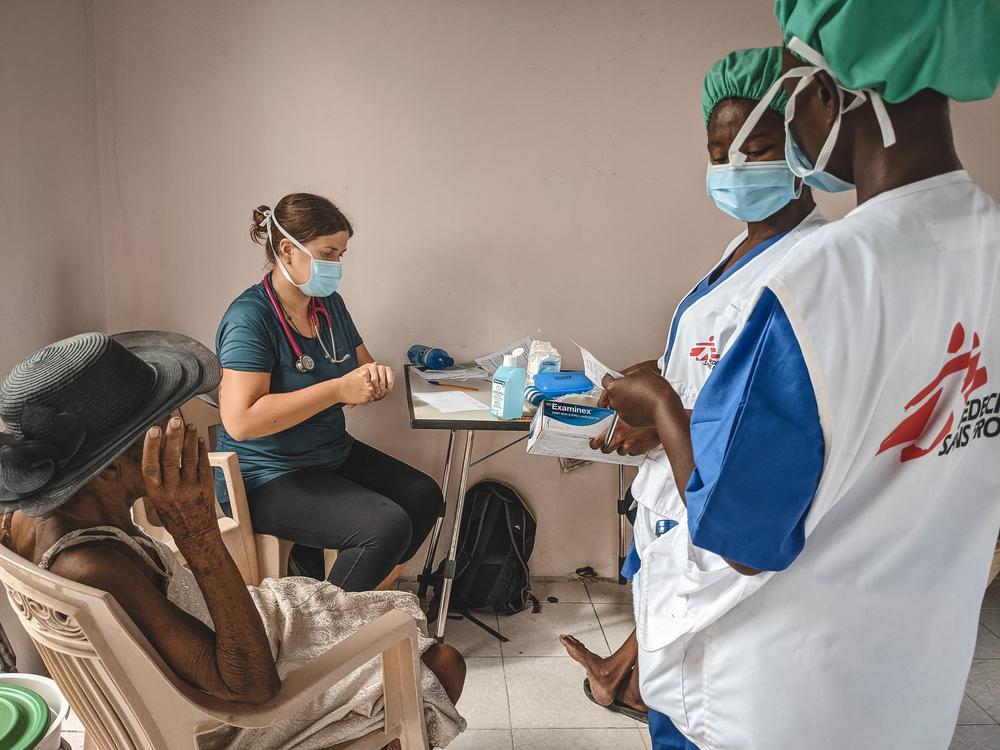
A Doctors Without Borders mobile clinic provides primary and mental health care services to people staying at an informal IDP camp in Les Cayes called Papa Numa. Dr. Magdalena Berges Mulet and two Doctors Without Borders nurses assist an elderly patient. Haiti, September 2021 © Nico Dauterive/MSF
The mobile clinics provide primary and mental health care services, and each clinic can see up to 100 patients a day. In the first week, the mobile clinics saw nearly 1,000 patients. Patients in need of specialized care are transported to functioning medical facilities, such as HIC in Les Cayes, when possible. In addition to injuries from the earthquake and related wounds and infections, mobile clinic patients often have respiratory and vaginal infections, skin conditions, signs of malnutrition and other illnesses associated with poor living conditions and a lack of clean water and hygiene facilities.
Doctors Without Borders has also worked, along with other organizations, to improve access to clean water and sanitation in these communities and has supported local health facilities with medical supplies and temporary structures since the earthquake.
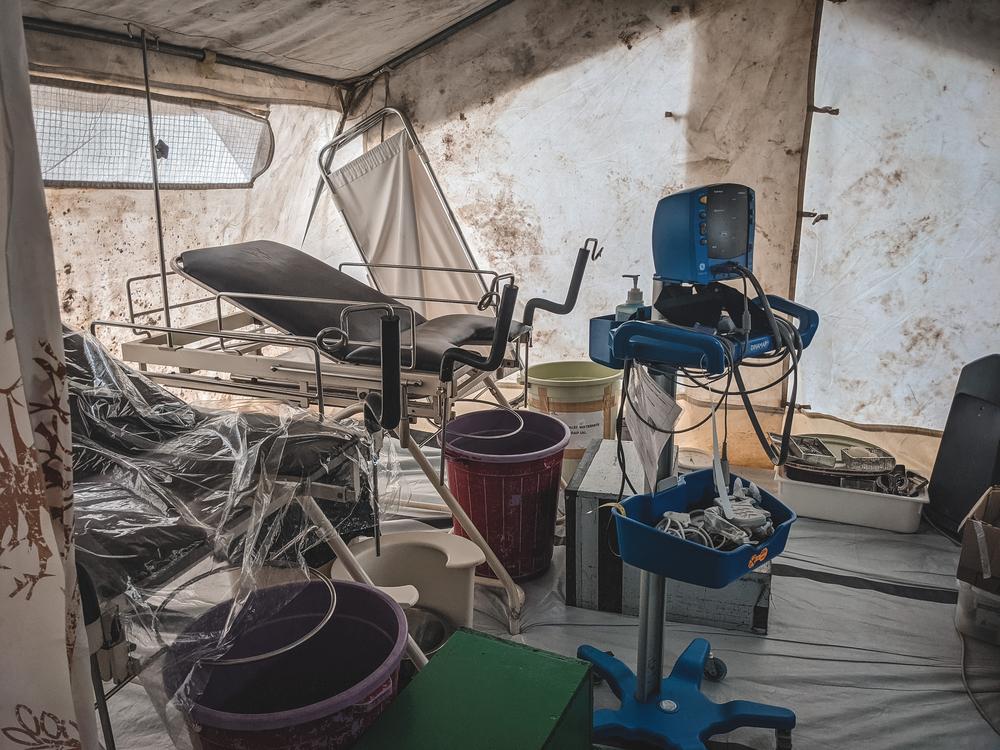
A tent where the Doctors Without Borders team continued to deliver babies and provide other urgent care to pregnant women after the hospital in Port-a-Piment was damaged by the earthquake. Haiti, August 2021 © Nico Dauterive/MSF
Keijzer says his team will continue to seek ways to reach the most remote villages affected by the earthquake. Doctors Without Borders’s regular project for maternal and sexual and reproductive health care in the Sud town of Port-a-Piment also continues to function, even though the building where Doctors Without Borders has worked for years was severely damaged by the earthquake.
In addition to our work in Sud, Doctors Without Borders has emergency response teams working the regions of Grand’Anse and Nippes, which were also heavily impacted by the earthquake. In Grand'Anse, we are supporting three primary health care centers which refer patients to Les Cayes when needed. Doctors Without Borders has been in Haiti for 30 years and in addition to responding to natural disasters, such as the 2010 earthquake and Hurricane Matthew in 2016, Doctors Without Borders aims to address critical gaps in health care access. Our regular activities continue, including at the Tabarre hospital in Port-au-Prince, where Doctors Without Borders is treating patients with severe burns as well as people with life-threatening traumatic injuries. Doctors Without Borders opened an emergency center in the Turgeau neighborhood of Port-au-Prince in August 2021. Doctors Without Borders also treats victims of sexual and gender-based violence in Port-au-Prince and Gonaïves.
